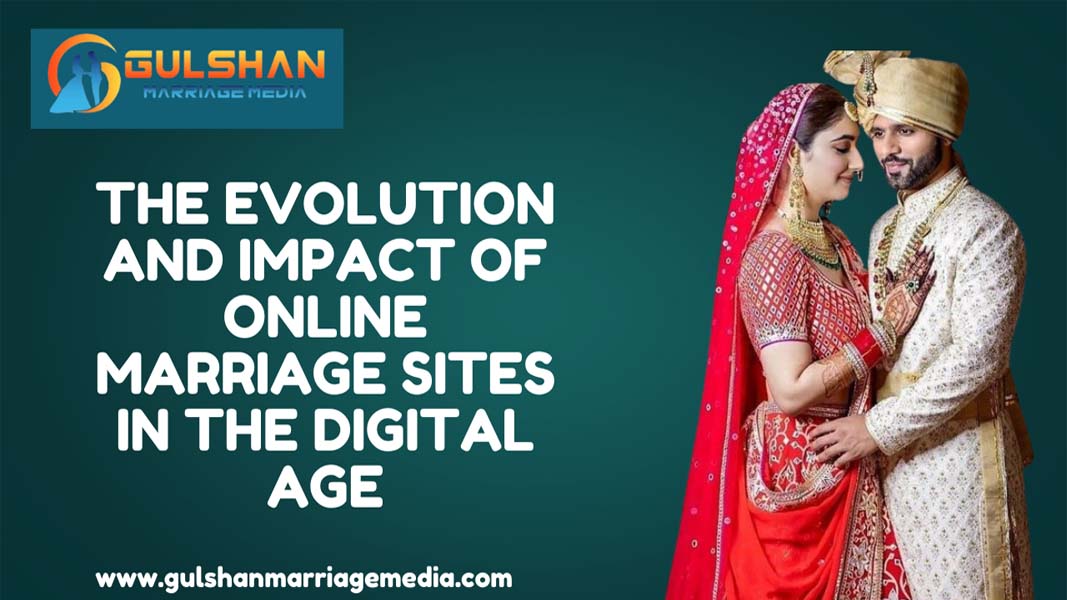The Evolution and Impact of Online Marriage Sites in the Digital Age on 2025
The Evolution and Impact of Online Marriage Sites in the Digital Age on 2025 In the 21st century, the way people find love and build relationships has undergone a dramatic transformation. Gone are the days when marriages were solely arranged by families or initiated through chance encounters. Today, online marriage sites have become a cornerstone of modern matchmaking, offering a convenient, efficient, and technology-driven approach to finding life partners. By 2025, these platforms are expected to evolve further, integrating advanced technologies like artificial intelligence (AI), virtual reality (VR), and block chain to enhance user experience and matchmaking accuracy.

This article explores the rise of online marriage sites, their features, benefits, challenges, and the future trends that will shape the industry in the coming years.
The Rise of Online Marriage Sites
From Traditional Matchmaking to Digital Platforms
Historically, marriages were often arranged by families, with limited input from the individuals involved. Over time, societal changes and the rise of individualism led to a shift toward love marriages, where couples met through social circles, workplaces, or chance encounters. However, the advent of the internet in the late 20th century revolutionized the way people connect.
The first online dating platforms emerged in the 1990s, offering users the ability to create profiles and connect with potential partners. These platforms initially catered to casual dating but soon expanded to include marriage-focused services. Today, online marriage sites are a global phenomenon, catering to diverse cultures, religions, and preferences.
Why Online Marriage Sites Gained Popularity
- Convenience: Online platforms allow users to search for partners from the comfort of their homes, eliminating geographical barriers.
- Wider Pool of Options: Users can connect with thousands of potential matches, increasing the likelihood of finding a compatible partner.
- Customization: Advanced algorithms and filters enable users to specify their preferences, such as age, education, profession, and lifestyle.
- Cultural Relevance: Many platforms cater to specific communities, religions, or ethnic groups, making them highly relevant for users seeking culturally compatible partners.
Features of Modern Online Marriage Sites
Modern online marriage sites are equipped with advanced features to enhance user experience and improve matchmaking accuracy. AI-powered algorithms analyze user preferences and behavior to suggest highly compatible matches. Advanced search filters allow users to narrow down options based on criteria like age, education, and lifestyle. Verification systems, such as biometric authentication, ensure profile authenticity and reduce scams. Multimedia profiles with photos, videos, and audio clips provide a comprehensive view of potential partners. Privacy tools like anonymous browsing and end-to-end encryption protect user data. Additionally, mobile apps and communication tools like video calls and instant messaging make connecting easier and more convenient.
As technology advances, online marriage sites have incorporated a range of features to enhance user experience and improve matchmaking accuracy. Here are some key features of modern platforms:
1. AI-Powered Matchmaking Online Marriage Sites
Artificial intelligence plays a central role in modern matchmaking. AI algorithms analyze user data, including preferences, behavior, and interaction patterns, to suggest highly compatible matches. Some platforms even use machine learning to refine their recommendations over time.
2. Advanced Search Filters
Users can specify their preferences using filters such as age, location, education, profession, income, and hobbies. This allows them to narrow down their search and focus on the most relevant profiles.
3. Verification Systems
To ensure authenticity and reduce fake profiles, many platforms offer verification features. These may include email verification, phone number verification, and even biometric authentication.
4. Privacy and Security
With growing concerns about data privacy, online marriage sites have implemented robust security measures. Features like end-to-end encryption, anonymous browsing, and profile blocking help protect user data and ensure a safe experience.
5. Multimedia Profiles
Modern platforms allow users to create dynamic profiles with photos, videos, and audio clips. This provides a more comprehensive view of a person’s personality and lifestyle.
6. Communication Tools
From instant messaging and video calls to virtual gifts and icebreaker questions, online marriage sites offer a variety of tools to help users connect and build relationships.
7. Mobile Apps
Most platforms now offer mobile apps, allowing users to access their accounts and search for matches on the go. Mobile apps often include additional features like push notifications and location-based matching.
8. Community and Support
Many platforms provide community forums, blogs, and expert advice to help users navigate the complexities of modern relationships. Some even offer coaching services or counseling sessions.
Benefits of Online Marriage Sites
Online marriage sites offer numerous benefits, making them a popular choice for finding life partners. They provide access to a global pool of matches, breaking geographical barriers. Advanced algorithms ensure highly compatible matches, saving time and effort. Users can customize their search with filters like age, education, and interests. These platforms cater to cultural and religious preferences, ensuring compatibility. They offer privacy and anonymity, allowing users to connect at their own pace. Cost-effective and convenient, online marriage sites eliminate the need for traditional matchmaking expenses. Overall, they empower individuals to take control of their search for a meaningful and lasting relationship.
Online marriage sites offer numerous advantages over traditional matchmaking methods. Here are some of the key benefits:
1. Access to a Global Pool of Matches & Online Marriage Sites
One of the biggest advantages of online marriage sites is the ability to connect with potential partners from around the world. This is particularly beneficial for individuals living in areas with limited dating opportunities.
2. Time and Cost Efficiency
Online platforms save users time and money by eliminating the need for physical meetings or travel. Users can connect with multiple matches simultaneously and take their time getting to know each other before committing to a relationship.
3. Customized Matchmaking
Advanced algorithms and filters allow users to find partners who meet their specific criteria. This increases the likelihood of compatibility and reduces the risk of mismatches.
4. Cultural and Religious Compatibility
Many platforms cater to specific communities, religions, or ethnic groups, making it easier for users to find partners who share their values and traditions.
5. Empowerment and Control
Online marriage sites empower users to take control of their search for a life partner. They can browse profiles, initiate conversations, and make decisions at their own pace.
6. Anonymity and Privacy
Users can maintain their privacy until they are ready to share personal information. Features like anonymous browsing and profile blocking provide an additional layer of security.
Challenges of Online Marriage Sites
Despite their many benefits, online marriage sites are not without challenges. Here are some of the key issues users may face:
1. Fake Profiles and Scams
The anonymity of the internet makes it easy for scammers to create fake profiles and deceive users. This is a major concern for many online marriage sites.
2. Overwhelming Choices
While having a wide pool of options can be beneficial, it can also lead to decision fatigue. Users may struggle to choose among hundreds or thousands of potential matches.
3. Mismatched Expectations
Not all users are looking for the same thing. Some may be seeking casual relationships, while others are focused on marriage. This can lead to mismatched expectations and disappointment.
4. Privacy Concerns
Despite security measures, data breaches and privacy violations remain a risk. Users must be cautious about sharing personal information online.
5. Cultural and Social Stigma
In some communities, online matchmaking is still viewed with skepticism or disapproval. This can create social pressure and discourage individuals from using these platforms.
The Future of Online Marriage Sites
As technology continues to evolve, online marriage sites are expected to undergo significant transformations. Here are some trends that will shape the future of the industry:
1. Integration of AI and Machine Learning Online Marriage Sites
AI will play an even greater role in matchmaking, with algorithms becoming more sophisticated and accurate. Machine learning will enable platforms to refine their recommendations based on user feedback and behavior.
VR and AR technologies will revolutionize the way users interact on online marriage sites. Virtual dates, immersive environments, and augmented profiles will provide a more engaging and realistic experience.
3. Block chain for Security
Block chain technology will enhance data security and transparency, reducing the risk of fake profiles and scams. Users will have greater control over their personal information.
4. Focus on Mental Health and Well-Being
Future platforms will prioritize mental health by offering resources like counseling, compatibility assessments, and stress management tools.
5. Inclusivity and Diversity
Online marriage sites will cater to a wider range of users, including LGBTQ+ communities, non-traditional relationships, and diverse family structures.
6. Hybrid Models
While online interactions will remain central, some platforms may offer offline events, meetups, or coaching services to complement digital matchmaking.
7. Sustainability and Values-Based Matchmaking
Users will increasingly prioritize partners who share their values, such as environmental sustainability, social responsibility, and ethical living.
Conclusion
Online marriage sites have revolutionized the way people find love and build relationships. By leveraging technology, these platforms offer a convenient, efficient, and personalized approach to matchmaking. While challenges like fake profiles and privacy concerns remain, advancements in AI, VR, and block chain are expected to address these issues and enhance user experience.
As we look ahead to 2025 and beyond, online marriage sites will continue to evolve, offering innovative features and catering to diverse needs. Whether you’re searching for a life partner or exploring new connections, these platforms provide a powerful tool for navigating the complexities of modern relationships.























gqk6io
knoyig
nf7in3
Very good https://is.gd/N1ikS2
Good partner program https://shorturl.fm/m8ueY
Very good partnership https://shorturl.fm/68Y8V
https://shorturl.fm/6539m
https://shorturl.fm/bODKa
https://shorturl.fm/A5ni8
https://shorturl.fm/9fnIC
https://shorturl.fm/YvSxU
https://shorturl.fm/XIZGD
https://shorturl.fm/68Y8V
https://shorturl.fm/FIJkD
https://shorturl.fm/TbTre
https://shorturl.fm/N6nl1
https://shorturl.fm/YvSxU
https://shorturl.fm/FIJkD
https://shorturl.fm/68Y8V
https://shorturl.fm/j3kEj
https://shorturl.fm/MVjF1
https://shorturl.fm/ypgnt
https://shorturl.fm/xlGWd
https://shorturl.fm/I3T8M
https://shorturl.fm/DA3HU
https://shorturl.fm/hevfE